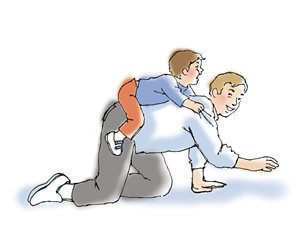

By Lauren Lowry
Clinical Staff Writer and Hanen SLP
Did you know that you already have the best toy for language development in your home? You didn’t buy it at a store – actually, it doesn’t cost anything. It’s portable, adaptable, and best of all, it’s tons of fun! Your child loves to play with it, more than any other toy. That’s because your child’s best toy is…YOU!
When you and your child play together without toys, you become the toy. This happens during social games like peek-a-boo, tickles, horsie rides, or chase. We call this type of social play “people games” because these games only involve people, not toys.
What is a people game?
People games are social games played with people, not toys. Here are some examples of familiar people games:
- Tickles
- Peekaboo
- Horsie Rides
- “Ring Around the Rosie”
- Games played on the hands and feet like “This Little Piggy”, “Pat-a-cake”, or “Round and Round the Garden”
- Chase
- Hide and Seek
Advantages of people games for language development
People games have many advantages when it comes helping children with delayed language development:
- It’s easier for your child to focus on you – For some children, having to constantly switch their attention back and forth between their parent and a toy is very difficult, and attention that could be spent learning from the parent ends up being focused on the toy. But during people games, your child only has to focus on you, and this makes it easier for him to pay attention to the actions, sounds, and words that you use during the game.
- It’s easier for you to focus on your child – Because it’s just you and your child, it’s easier to notice and respond to his subtle ways of communicating.
A recent study found that parents of children with severe communication delays tend to follow their child’s lead and be more responsive during social play than while playing with a toy [2].
- People games are played the same way each time – This repetition allows you to use the same actions and words over and over again. Because of this, it’s easier for your child to learn these words and actions, and to know how and when to participate in the game.
- Children with delayed language can participate in people games – There are many nonverbal opportunities for your child to participate because people games usually involve actions or movements. If your child uses words, he can participate by saying something when you pause and wait during a predictable moment during the game.
- You can make up your own people game – Sometimes the best people games are the ones parents create for their child based on his interests. For example, for a child who loves jumping, making up a game or song while the child jumps on the bed or a trampoline can be very motivating. When you make up your own game, you can tailor it to your child’s language goals. You can use simple, repetitive words and phrases that are at your child’s language level.
- People games are fun! – These games often revolve around a song your child enjoys or an action your child loves to do (like running or jumping). This makes them a fun context for learning to communicate.
(To be continued…)
References
- Weitzman, E. (2017). It Takes Two to Talk: A Practical Guide for Parents of Children with Language Delays (5th ed.). Hanen Early Language Program: Toronto, Ontario.
- DeVeney, S., Cress, C. J., & Lambert, M. (2016). Parental directiveness and responsivity toward young children with complex communication needs. International Journal of Speech-Language Pathology, 18:1, 53-64.